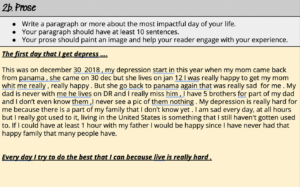Case Study: Ruby
Rubelis, or Ruby, Piña Perelis is a 15 year old who moved to the US from the Dominican Republic 2 years ago. Since then she’s travelled through the Worcester Public School District, starting at East Middle, switching to Forest Grove, and landing at South High School where she is in one of my 9th Grade College Prep English classes.
Up until a few weeks ago, Ruby was the picture of disengagement in English class. She was not completing the readings, which were suspenseful short stories written by old white men and featured language that was difficult and at times, archaic. The translations for these stories didn’t seem to be wholly accurate based on the response to them from our ELL students. It’s hard to even find samples of her work from the first unit of the year because it was so rare to even see her turning anything in. When we moved on from our suspenseful short stories unit and onto Elizabeth Acevedo’s, The Poet X, we saw a transformation in Ruby. The Poet X is about a 15 year old, Dominican-American sophomore in high school, Xiomara, navigating high school, her first romantic relationship, her newfound love for poetry, and her relationship with her mother who wants her to be confirmed in the Catholic church despite Xiomara’s personal hesitation. The first sign of enthusiasm we saw from Ruby was during a bellringer which asked students to rate how much they liked the book so far after reading a few poems. It was projected on the whiteboard with emojis to use, the top option being a big red heart. Ruby walked into the room, read the question and jumped up, high fiving the heart. Since then, she has been a much more active participant in the reading process. My mentor teacher purchased 2 Spanish copies of the book, which Ruby prefers to use. I talked to Ruby about why she prefers to read the Spanish version, when she is certainly capable of reading the English version. She told me that even though she can understand what is happening in the plot when she reads in English, she has trouble answering questions and digging deeper when we ask questions about the reading. She says she can’t explain how she feels about things she reads in English. I took this to mean that she has trouble picking up on the tone and mood of pieces written in English.
While we read in class, she is paying attention astutely and will yell out “YES!” at certain points. It’s been very satisfying to see such a change in her. Getting Ruby to engage with the reading process was one task, but the harder one was inspiring her to write. For the first bellringer she turned in, which asked her to describe Xiomara in 3 or more sentences, Ruby wrote: “she is a rude girl.” As we continued to read, and the assignments grew more rigorous, I was worried that Ruby would slip back into her old habits. However, I was pleasantly surprised that with a bit of pressure and nagging from my mentor teacher and I, she was finally starting to write more willingly. A few weeks into the unit, Ruby submitted this for an assignment: My mentor teacher and I were thrilled to see her write so many sentences, and to be vulnerable in a way she had never been with us before. While we were worried she would slip into her old habits after The Poet X, she continued to progress and engage so much that she ended up moving up a level.
My mentor teacher and I were thrilled to see her write so many sentences, and to be vulnerable in a way she had never been with us before. While we were worried she would slip into her old habits after The Poet X, she continued to progress and engage so much that she ended up moving up a level.